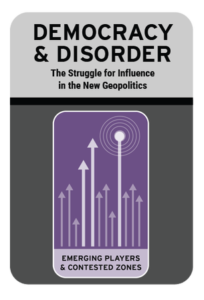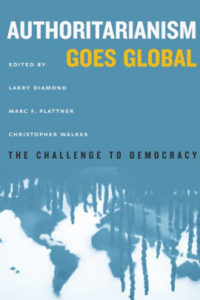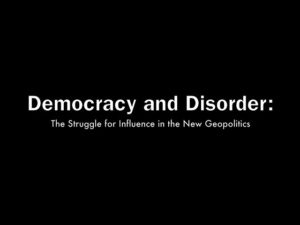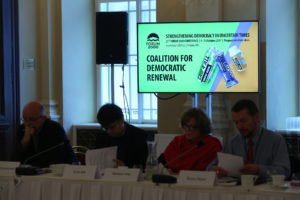
Brookings
At the heart of the new era of geopolitical competition is a struggle over the role and influence of democracy in the international order, according to two prominent analysts. Recent power plays by Russia and China, cast as moves to establish spheres of influence, are in fact broader than that. Competition between great powers is over nothing less than the future democratic character of the international system, say the Brookings Institution’s Bruce Jones and Torrey Taussig.
Both Russia and China, using different means and with different strength, seek to achieve three objectives, they write in Democracy & Disorder: The struggle for influence in the new geopolitics:
- to develop military and economic spheres of influence in their regions;
- to weaken democratic institutions and norms that challenge their own internal legitimacy; and
- to diminish Western dominance of the international order.
To date, the West’s response has been insufficient to the challenge, they add. Now, in the wake of the global financial crisis, two critical dynamics have unfolded concomitantly:
- First, the powerful democracies of the trans-Atlantic community (the bulwark of the Western-led order) are facing political turmoil at home and setbacks in the liberal quality of their own governments.
- Second, the democracies find themselves losing ground internationally to authoritarian powers bent on breaking the hold of the democracies on the character of the international order.
 The past decade has demonstrated that democratic change is not inevitable, but must be doggedly pursued by free societies, argues Rep. Adam Schiff (D-CA), Chairman of the House Intelligence Committee. At present, democracies are backsliding the world over, with threats to the rule of law, freedom of the press, and independent civil society growing ever more severe, he writes for the Atlantic:
The past decade has demonstrated that democratic change is not inevitable, but must be doggedly pursued by free societies, argues Rep. Adam Schiff (D-CA), Chairman of the House Intelligence Committee. At present, democracies are backsliding the world over, with threats to the rule of law, freedom of the press, and independent civil society growing ever more severe, he writes for the Atlantic:
Today, it is clear that trust in the inevitability of democratic ascendance was, if not misplaced, certainly premature, and a new war of ideologies has emerged pitting liberal democracy against autocracy – not the old autocracy of monarchial Europe, but a rebranding that distorts and subverts the institutions that are the foundation of the West’s success – strong legislatures, independent judiciaries, a free press, and dynamic civil societies.
The unipolar moment of the 1990s has given way to an emboldened Russia and an increasingly assertive China, both bent on promoting their own brand of authoritarian rule through a combination of military might, cyber–informational warfare and theft, and the skillful use of economic leverage, Schiff told today’s House Select Intelligence Committee hearing on “National Security Implications of the Rise of Authoritarianism Around the World.”
 The hearing heard testimony from Madeleine Albright, Former Secretary of State; Anders Fogh Rasmussen, Former Secretary General of NATO; Teng Biao, co-founder of the Open Constitution Initiative; and Andrea Kendall-Taylor, senior fellow and director of the Center for a New American Security’s Transatlantic Security Program.
The hearing heard testimony from Madeleine Albright, Former Secretary of State; Anders Fogh Rasmussen, Former Secretary General of NATO; Teng Biao, co-founder of the Open Constitution Initiative; and Andrea Kendall-Taylor, senior fellow and director of the Center for a New American Security’s Transatlantic Security Program.
Rising authoritarianism is a global threat, he noted, adding that Director of National Intelligence Dan Coats had “pointed to an alignment between Chinese and Russian interests not seen since the 1950s – interests that are inherently antagonistic toward the sanctity of human rights, democratic processes, and individual liberties.
As global democracy retreats, ethnic cleansing is on the rise, say two leading commentators. One could make the argument that the atrocities in places like South Sudan and Myanmar are the work of rogue regimes, argue Michael J. Abramowitz, President of Freedom House, and Arch Puddington, Distinguished Fellow for Democracy Studies.
But the embrace of forced demographic change by world powers, especially China, which is making an aggressive bid for global leadership, has truly alarming implications. The international norm against ethnic cleansing is not just being swept aside. It is at risk of being replaced by a new standard that authorizes rulers to use any means necessary to create their preferred citizenry — a sinister reversal of democracy, in which free citizens are meant to choose their rulers. RTWT

Brookings
“The issue of authoritarian interference is the focus of much analysis at research institutions in Washington and around the world,” the Brookings Institution’s Jones and Taussig add. “Their efforts focus on assessing foreign influence and interference through cyber and information tools and developing strategies and mechanisms to protect democratic systems,” such as the National Endowment for Democracy’s Sharp Power: Rising Authoritarian Influence report.
But democracies “still have the intrinsic strength to shape and judiciously advance a values-based order that protects democratic freedoms,” they contend. To preserve the prospects for democracy in a changing international order will require serious effort along four lines:
-

21st Forum 2000 Conference
Democratic renewal: A shared international agenda. Instead of a posture of “democracy promotion,” the West should join with other democracies in a shared agenda of domestic renewal both to shore up the essential foundations of democracy and to strengthen its international appeal. This requires a clear focus on economic inclusion.
- Detoxifying identity politics and migration debates. As part of this agenda of democratic renewal, governments and civil society must find ways to detoxify identity politics. This requires open debates on migration and a focus on local and urban integration, as well as eschewing the hateful rhetoric that ties migration to terrorism and violence.
- Defending democracy in Europe and Asia. To defend the space for democracy in both Europe and Asia, democracies need to push back on authoritarian powers’ interference, respond firmly to illiberal developments within alliances and institutions, and build democratic cooperation across the Indo-Pacific. Given the centrality of Asia to the global interplay between democracy and order, we also propose a new “Dialogue of Democracies in Asia.”
- Deepening cooperation with non-Western democracies. Across the board, but particularly in terms of support to nascent or emerging democracies in the developing world, both Western and non-Western democracies should advance democratic cooperation on aid, infrastructure, governance support, and crisis management, joining forces to compete more effectively with development models advanced by China that may prove to have adverse effects on democratic governments.







